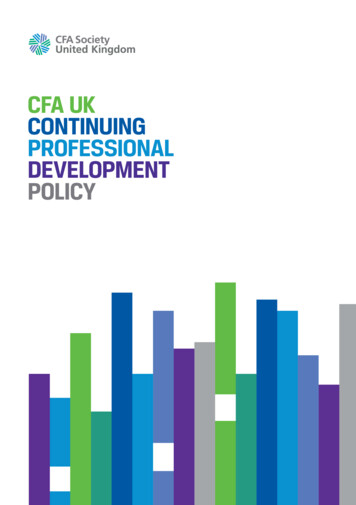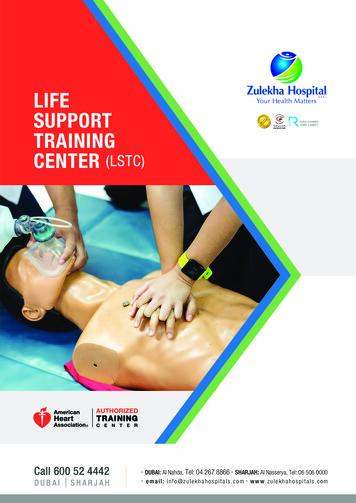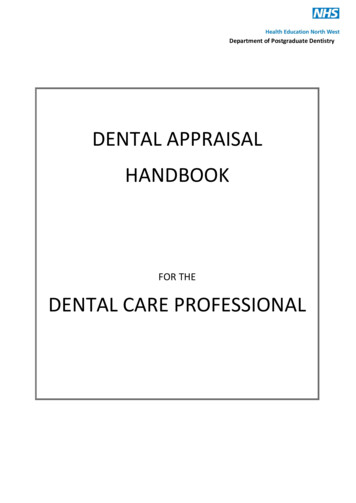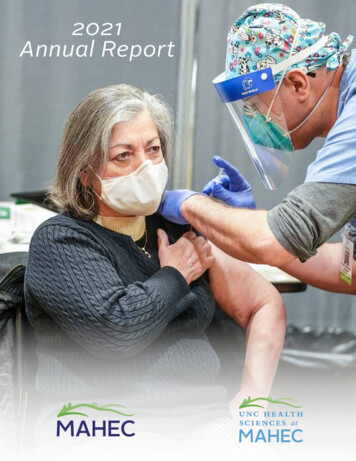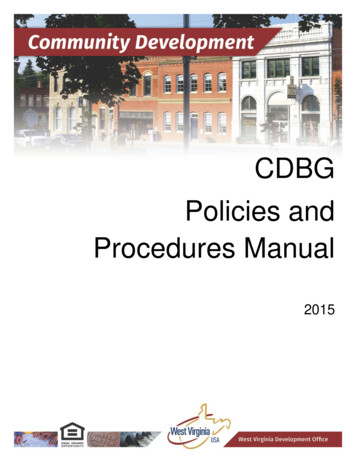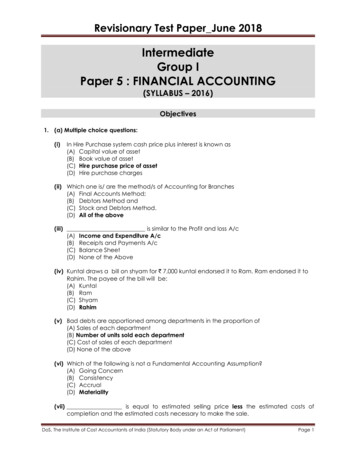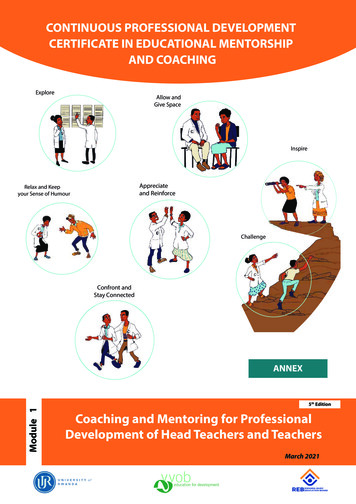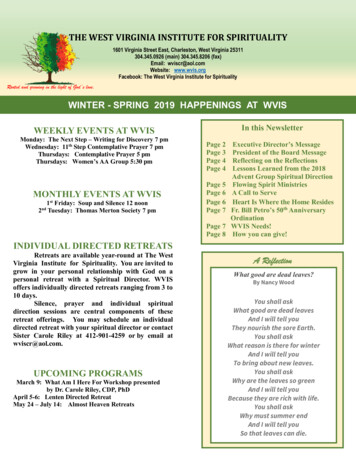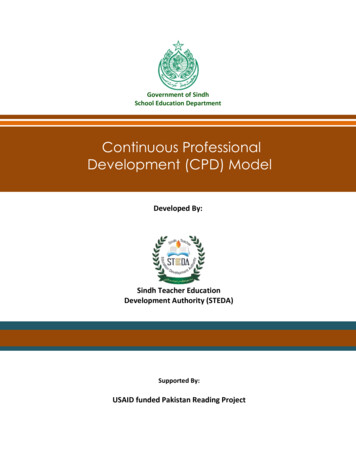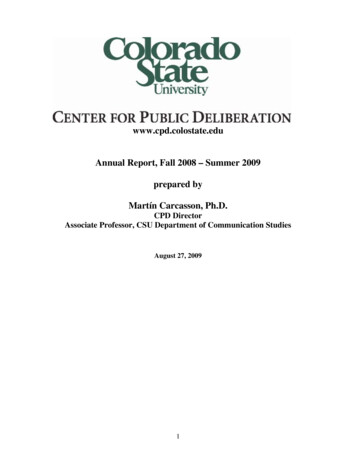
Transcription
www.cpd.colostate.eduAnnual Report, Fall 2008 – Summer 2009prepared byMartín Carcasson, Ph.D.CPD DirectorAssociate Professor, CSU Department of Communication StudiesAugust 27, 20091
CPD Annual Report, 2008-2009This report details the activities completed in the third year of the CSU Center for PublicDeliberation (CPD). The 2006-2007 and 2007-2008 reports are also available online. Formore information on the CPD, go to www.cpd.colostate.edu, or contact Martín Carcasson atmcarcas@colostate.edu or (970) 491-5628.Part I: CPD Highlights for 2008-2009 .Part II: CPD Background .Primary Goals CPD Advisory Board . CPD Student Associates Part III: Fall 2008- Summer 2009 ActivitiesMajor projects. . Pathways Past Poverty Candidate Forms . Childhood Obesity Forums . Fall 2008 Community Issues Forum . Bicycle Safety Summit . . CSU Student Media . . Improving Higher Education Summit Deliberative democracy training workshops Additional CPD Events . .Additional Activities by Director Martín Carcasson Part VI: CPD funding summary 233456667677891112Part I: CPD Highlights for 2008-2009At the end of our third year, three recent key changes to the CPD have significantlyincreased our capacity. First, the Department of Communication Studies hired a new tenuretrack assistant professor, Leah Sprain, who will serve as the assistantdirector of the CPD. Dr. Sprain completed her Ph.D. at the University ofWashington, and will significantly increase the capacity of the CPD. Herresearch is focused on local practices of democracy, which includes arange of ways that individuals see themselves acting politically fromenvironmental activism to conscious consumption to participation incommunity deliberation. Drawing on cultural communication andrhetorical perspectives, she analyzes processes for community decisionmaking and strategies of organizing for social change. Second, theCPD was given its first physical location on campus. Rather than beingrun out of Dr. Carcasson’s personal office, the CPD is now located atEddy 210. The new office includes space for small group meetings, as2New CPD AssistantDirector, LeahSprain, Ph.D.
well as plenty of shelves for material on deliberative democracy and collaborative decisionmaking. Finally, director Martín Carcasson was granted promotion and tenure during thesummer of 2009, insuring that he and the CPD will continue to be a part of the Fort Collinscommunity for the foreseeable future.2009 also saw the first publication connected tothe work of the CPD. Dr. Carcasson published a report with the Center for the Advancementof Public Engagement (CAPE). The report, entitled, “Beginning with the End in Mind: A Callfor Goal-Driven Deliberative Practice,” was very well received by the deliberationcommunity, and is available online athttp://www.publicagenda.org/files/pdf/PA CAPE Paper2 Beginning SinglePgs Rev.pdfSandy Heierbacher, director of the National Coalition for Dialogue and Deliberation, discussedthe report on the NCDD website, and has already used it to explain the broad purposes ofdeliberative practice (see her comments at http://www.thataway.org/?p 1571).We also increased our capacity in 2009 by acquiring a set of 150 “wireless electronickeypads” that allow us to do real time surveys as necessary during our meetings, and thuseasily capture demographic data and add quantitative information to our reports. The keypads,using TurningPoint Technologies equipment, are another critical tool for the CPD to use inhelping improve the quality of political communication in Northern Colorado. Funding for thekeypads was primarily provided by the Department of Communication Studies, withadditional support from the United Way of Larimer County.The remainder of this report will review many of the basics of the CPD, as well asspecifics about the projects we completed this year. Feel free to contact us atcpd@colostate.edu or 970-491-5628 for any additional information. Our website also hascopies of reports from many of the major events mentioned in this report:www.cpd.colostate.edu.PART II: CPD BACKGROUNDThe CSU Center for Public Deliberation officially began operations inAugust of 2006, under the direction of Martín Carcasson, then anassistant professor in the Department of Speech Communication (nowCommunication Studies). The official mission statement of the CPD is,“To promote the development of a vibrant deliberative democracy inNorthern Colorado.”Deliberation is an approach to politics in which citizens, not just expertsor politicians, are deeply involved in public decision making. Workingwith trained facilitators who utilize a variety of deliberative techniques,citizens come together and consider relevant facts and values frommultiple points of view; listen to one another in order to think criticallyabout the various options before them and consider the underlyingtensions and tough choices inherent to most public issues; andultimately seek to come to some conclusion for action in the form of areasoned public judgment.3CPD Director, MartínCarcasson , Ph.D.
Working as an affiliate of the National Issues Forum network (www.nifi.org), part of theNational Coalition for Dialogue and Deliberation (www.ncdd.org) and the University Networkfor Collaborative Governance (http://www.policyconsensus.org/uncg/index.html), the CPDorganizes and hosts many events in the local community, including public forums on nationaland local issues and various workshops tied to public participation, collaborative goverance, andcivic engagement. The CPD trains non-partisan facilitators and conveners focused on helping thelocal community come together and address critical issues more effectively. Deliberationrequires safe places for citizens to come together, good and fair information to help structure theconversation, and skilled facilitators to guide the process. The CPD is dedicated to providingthese three key ingredients to Northern Colorado.The CPD has three primary goals:To Enhance the Local Civic Culture Increase citizen participation in community problem solving Decrease the sense of polarization, cynicism, and frustration with politics Help develop a civic habit of relying on deliberation to address local concernsTo Expand Collaborative Decision-Making Promote interconnections between local government and citizens Expand and improve the role of the public in decision-making processes Help incorporate deliberative techniques in local institutionsTo Improve Civic Education Study and improve methods of developing citizenship skills at all levels (K-12, highereducation, citizen education) Promote the inclusion of deliberative concepts and activities in curriculaThe tag line used on the front of the CPD pamphlet and website perhaps best captures theoverall purpose of the CPD: Dedicated to enhancing local democracy through improvedpublic communication and community problem solving.The organizational structure of the CPD includes director Martín Carcasson, AssistantDirector Leah Sprain, graduate assistant Mallorie Bruns, an advisory board, and a group ofstudent associates.The current advisory board includes:Karrin Anderson, CSU Department of Communication StudiesJen Johnson, Assistant Director, CSU Student Leadership and Civic Engagement officeEllen Laubhan, Director of Communications, Poudre School DistrictMichael Liggett, PSD Think Tank., Fort Collins Library BoardBrad MacDonald, CSU Department of Political ScienceJohn Meyer, President of Fort Collins Church Network and Pastor of SummitviewChurchRobert Moore, Executive Editor, Fort Collins ColoradoanGinny Sawyer, Neighborhood Administrator, City of Fort CollinsLinda Mahan, Larimer County League of Women Voters4
William Timpson, CSU Department of EducationDeni LaRue, Larimer County Community Information ManagerPete Seel, CSU Department of Journalism and Technical CommunicationJessica Thompson, CSU College of Natural ResourcesCPD student associates are CSU undergraduates that are chosen for the program from anapplication process. Student associates (SAs) typically make a two semester commitment, but aone semester program is available for graduating seniors. Student associates receive 3 hours ofSPCM 408 (Applied Deliberative Techniques) credit their first semester and at least one hour ofSPCM 486 Practicum credit for their second semester with the CPD. Approximately 10-15 newstudents are selected to begin their work with the CPD each semester, and they join around 10returning students who completed their first semester of the program the preceding semester.Student associates are trained to be impartial researchers, conveners, facilitators, and reporters ofpublic discussion, and are involved in all aspects of CPD projects.Fall 2008 CPD Student AssociatesTop from left: William Lamons, ReneOctaviano, Ben Weikert, ShannonSinglevich, Darrick Hildman, ShaneArmstrong, Katie Harris, Meghan Smiley,Eric Saulnier, Elena UlyanovaBottom from left: Alicia Rehn, KelseyPautler, Suzy Stanley, Sarah Stout, MeganWhite, Rebecca Brofft, Alex HernandezSpring 2009 CPD StudentAssociatesTop row from left: Front row: JohnWilcoxen, Allison Melton, Sarah Stout,Megan White, Bill Lamons, Suzy Stanley,Elena Ulyanova, Karolyn Pearson,Melissa StillMiddle Row: Adam McAlister, KelseyPautler, Addison Welsh, Meghan Smiley,Teddy Saldivar, Kate Belford, RebeccaBrofft, Alex Hernandez, Renee Octaviano,Heather Baily, Darrie Burrage, KorrieAiken; Back Row: Tyler Geddes, MallorieBruns, Aleta Rudeen, Darrick Hildman,Shane Armstrong, Eric Saulnier, ShannonSinglevich, Jack Becker; Not pictured:Sara Murphy5
PART III: FALL 2008- SUMMER 2009 ACTIVITIESThis section details the primary activities of the CPD during its third year. It is organized infour sections: Major projects, training workshops, additional CPD Events, and additionalactivities by Director Martín Carcasson.1. Major ProjectsThe CPD had six major projects during the Fall 2008-Spring 2009 year, and then several smaller eventswe were involved with. The major projects were:Pathways Past Poverty (P3) Candidate ForumsThe CPD, working with the P3 Policy Subcommittee,designed and ran two candidate forums in Fall 2008focused on poverty issues. A forum on September 23rdinvolved all 10 local candidates for the state legislature,including 8 vying for Colorado House of Representativesslots, and 2 for State Senate, including 5 incumbents, 5challengers, 5 Democrats, and 5 Republicans. TheSeptember 30th forum involved all six candidates forCounty Commissioner. Working with CPD students andCandidates for the Colorado state houseparticipate in the P3 Candidate Forumsthe P3 policy committee, we researched the issues andfocused on poverty issues in Larimerdesigned the questions. Director Carcasson moderated theCountyforum, and students assisted with the sign in table,timekeeping, and notetaking. Both forums were well attended and garnered positive press.Childhood Obesity ForumsThe CPD, working from a grant from the Kettering Foundation and a group of four other publicdeliberation centers from across the country, as well as a local organization focused on obesityand nutrition issues, hosted two local public forums focused on childhood obesity issues. Thefirst forum was held at Loveland High School on October 16th, 2008, and the second during ourFall 2008 Community Issues Forum on November 17th. The events culminated in a reportprovided to LiveWell Colorado. In the spring, working with a group of high school studentsconnected with the PSD Student Think Tank that we trained as facilitators, we facilitated anotherfive forums on student nutrition issues at local middle and high schools. Schools included Polaris(7th and 8th grade), Warner Elementary (2nd and 5th grade), and Fort Collins High School (10thgrade). This project is ongoing, as additional plans are being made to run forums in PSD schoolsin the spring of 2010 in conjunction with the PSD Wellness Coordinator.6
Fall 2008 Community Issues ForumOur Fall 2008 Community Issues Forumhighlighted four issues, all of which involvedCPD students developing original material andthen producing original reports. The four issueswere: Politics in the Classroom, ChildhoodObesity, Civic Education, and Fort CollinsFuture Growth and Development. 135 studentsand community members attended. The CivicEducation forum involved our first use of a“Wisdom Café” style deliberation, in whichparticipants cycled between tables of varioustopics, and had the opportunity to writecomments on the tables for the next group toconsider.Participants at the Fall 2008 CommunityIssues Forum listen to the opening remarks.Bicycle Safety SummitIn early spring of 2009, the CPD was asked by the City of Fort Collins Bicycle Coordinator, DKKemp, to help with developing and facilitating an event that would allow the community todiscuss potential community responses to the tragic deaths of two bicyclists in the city during2008. After hosting planning meetings that brought together three bicycle advocacyorganizations, including Bike Fort Collins, the Fort Collins Bicycle Coop, and FC Bikes, as wellas the CSU police department, an event was planned and publicized. On February 12, 79community members attended the Bicycle Safety Summit at the Drake Centre. A report wasproduced and provided to the organization to assist in their planning for additional safetymeasures in Fort Collins.Participants at the Bicycle Safety Summit at the Drake Centre.7
CSU Student MediaThe CPD was asked to help the newly formed Colorado State University Student MediaCorporation to gather feedback from students and staff as they continued to transition from acampus entity to a stand alone non-profit corporation. Director Carcasson worked closely withstudent media leadership to identify their needs and develop a process for the organization todevelop a new mission statement and list of key values. Written surveys were collected fromorganizational leaders, and two “input sessions” facilitated by CPD students were held on March28 and March 31 to allow students and staff associated with the organization to provide ideas andfeedback on the organization’s goals, strengths, and weaknesses. An additional forum for thoseconnected to CSU public affairs was facilitated by Carcasson. The information was provided toorganizational leadership, and Carcasson facilitated additional leadership meetings to developthe mission and core values statements, which we completed and adopted by the organization inMay 2009.Improving Higher Education SummitBuilding off one of the sessions during theFall 2008 Community Issues Forum, CPDstudents led by Meghan Smiley developed amajor event to engage students in theimprovement of the quality of their education.The project was a response to concerns overthe quality of higher education in the US asexpressed in the 2008 report by then U.S.Secretary of Education Margaret Spellingsand the publication of Derek Bok’s OurUnderachieving Colleges. The long termproject hopes to engage students, faculty, andstaff in discussion to improve the quality ofeducation at CSU, particularly in terms ofCPD Student Associate Shannon Singlevich leads hercurriculum, evaluation, and classroomtable at the Improving Higher Ed Summit in April.experiences. The purpose of the project wasto discover and analyze the main issues preventing higher education from achieving acompetitive quality. Despite a last minute snow storm, the event attracted 50 students for a threehour meeting on a Saturday at the Drake Centre. A report on the event was completed, and theproject continued in the fall of 2009 with a “Study Circles” process that brought a small group ofstudents from most of the university’s colleges together for extended discussions of improvinghigher education over four meetings in November. A special meeting for CommunicationStudies majors on improving the major was also held in the fall of 2009. The project willcontinue in 2010.8
2. Deliberative Democracy training workshopsAnother key aspect of the work of the CPD is developing and hosting workshops to trainstudents and community members to be facilitators of public discussion. Workshops are heldevery semester for CPD student associates, and an additional workshop was held for the PSDThink Tank students in February 2009. Each summer, we have also hosted a free three dayworkshop for the community. The June 2009 workshop included participants from three CSUdepartments, the City of Longmont, the Poudre School District, the PSD Partnership Center, theColorado Association of School Executives, the U.S. Department of Defense, and the JeffersonCounty Conservation District, as well as a former Larimer County county commissioner. Wealso hosted Folorunsho Moshood, a Nigerian socio-political activist and researcher who had beenworking with the Kettering Foundation learning about deliberative practice.Plans are underway to develop a more specific set of workshops for particular audiences, such asschool principals, school board members, or mayors of small cities. For more information aboutCPD workshops, contact Martín Carcasson at cpd@colostate.edu.9
3. Additional CPD EventsPathways Past Poverty Community Mobilization Project (www.pathwayspastpoverty.org)The CPD, in partnership with the United Way of Larimer County, launched the Pathways PastPoverty community mobilization effort (P3) in October 2007, a long term project that willcontinue for many years, and include many public events. The project currently involves severaltask teams that are developing specific proposals for projects that will be partly funded by theUnited Way’s new “Bridging the Gap” fund. Working with United Way VP of CommunityInvestment Mary Atchison and the United Way P3 Coordinator Marija Weeden-Osborn,Carcasson serves as the primary facilitation and process advisor of the overall project. CPDstudents participated in eight initial “approach committees” that met several times during thespring of 2008, and then the CPD then designed and facilitated two community open houses inApril and May 2008 to gather public feedback on preliminary goals developed by the approachcommittees, which received significant media coverage. A total of 250 community membersparticipated over the two forums. During the fall of 2008 and spring of 2009, CPD students werenot as involved in the project, but Carcasson continued to work as an advisor and member of theAdvisory Committee and Steering Committee. Additional public forums involving CPD studentsare in the initial planning stages for spring 2010.PSD Think TankThe CPD continues to work with a group of PSD high school students representing five differenthigh schools as they serve in the PSD Think Tank. Think Tank director Elaine Holmes from FortCollins High School had ran the group for several years, and they serve as studentrepresentatives for the district on a variety of issues. Think Tank students have been oftenparticipants in CPD events, and then in February of 2008, twelve students were trained asfacilitators during an all day workshop run by Carcasson. Those students then assisted in theChildhood Obesity Project, and will be utilized in coming years for a variety of projects. Manyof the students that were trained were sophomores, and additional trainings for new students willlikely be held to continue the relationship.Now that they are trained, these students can not only serve as the student voice for the district,but can serve as a conduit to a much broader student voice. They are scheduled to present theirwork at the Colorado Association of School Boards annual conference in December, and willwork on a variety of topics during the school year. Plans are also underway for the students tohave their own television show on the PSD public access channel.Concerned Larimer (www.concernedlarimer.org)Concerned Larimer (CL) is a new organization that has developed in Larimer County focused onworking within the faith community to examine what role that community should play inaddressing issues of poverty and need. In particular, the organization hopes to develop a networkof “connectors” from various faith institutions across the county that will work together toexplore issues of interest and develop increased capacity. CPD Director Carcasson serves on theadvisory committee of Concerned Larimer as a representative from Pathways Past Poverty, andhas assisted in the training of CL connectors. Three all day trainings have been held during thefall of 2009, with support from the CPD as well as Larimer County.10
Campus ForumsThe CPD also runs many forums on campus at CSU, both to expose students to deliberativeforums and a different way of doing politics, and to provide CPD students with additionalopportunities to hone their facilitation skills. During the 2008-2009 school year, the CPD ranforums in classes that totaled 656 students. Forums primarily utilized National Issues Forumissue books, and included topics on the Energy Problem, Racial and Ethnic Tensions,Immigration, Health Care, the Environment, and Improving Community Politics. Classes thathosted the CPD include IU175, SPCM 207, SPCM 437. The CPD also ran an evaluation processfrom the SPCM 479 capstone class in May 2009.4. Additional Activities by Director Martín CarcassonAs the director of the CPD, Martín Carcasson also participates in a number of events and servesthe community in a number of capacities. During the last year, Dr. Carcasson has: Continued to serve as lead facilitator and primary advisor to the Pathways Past Poverty project. Served as a member of the Pathways Past Poverty Policy Change Committee. Served as a volunteer process consultant to the Poudre School District on public engagementefforts. Presented at the annual conference of the Colorado School Public Relations Association. Co-presented a “short course” on Deliberative Democracy at the National CommunicationAssociation. Presented at Center for Law and Democracy Civic Education workshop in Boulder and FortCollins. Presented at the CSU Climate Change teach in. Interviewed on Radio Times, Philadelphia NPR concerning the Health Care Town Hallmeetings. Presented to the Northern Colorado members of the Colorado Association of School PublicRelations Association. Guest lectured on deliberative democracy in a variety of CSU classes, including thePresidential Leadership Program, the Key Scholars program, and the School of Education. Attended a number of training workshops and meetings throughout the year to continue toincrease the capacity of the CPD and improve the training of CPD associates. Over the last twoyears, Dr. Carcasson has participated in the following events:o Communication Scholars and Deliberative Democracy Workshop at the KetteringFoundation Democracy Exchange Conference in Dayton, OHo Attended Center for Law and Democracy Civic Education retreat in Bouldero Attended National Coalition for Dialogue and Deliberation conference in Austin,TX11
o Attended University Network for Collaborative Governance Meeting in Austin,TXo Attended a workshop of Deliberative Democracy and Higher Education at theKettering Foundation in Dayton, OHo Attended a colloquium on democracy and liberal arts education at WabashCollege in IndianaDr. Carcasson also has been completing a variety of research projects related to deliberation andcollaborative problem solving. He is scheduled to be on sabbatical in the spring of 2010, and willbe working on publishing insights from his first four years with the CPD. His report, “Beginningwith the End in Mind: A Call for Goal-Driven Deliberative Practice,” was published by theCenter for the Advancement of Public Engagement and is available online athttp://www.publicagenda.org/files/pdf/PA CAPE Paper2 Beginning SinglePgs Rev.pdfPART IV: CPD FUNDINGThe CPD has received funding from a number of generous sources during its three years. A CSUCollege of Liberal Arts Academic Enhancement Program Grant of 7,795 was awarded in thespring of 2006 that provided funding for a course release, research assistant, and travel for Dr.Carcasson to originally develop Center for Public Deliberation. A grant from the Council ofPublic Policy Education provided 5,000 a year for the first three years (2006-2009). The CSUDepartment of Communication Studies matched that grant, providing an additional 5,000 a yearof ongoing support. The department also provides for Dr. Carcasson’s salary, as well as in-kindsupport in the form of his office, a storage area, and access to a copier and supplies.The Communication Studies department also provided one-time funding for the CPD to purchasea set of 150 electronic keypads (the United Way also provided 500 toward that purchase).The Bohemian Foundation through its Pharos Fund grant process has also been a very strongsupporter of the CPD. In our three years, we have received three grants from the Pharos Fund,totaling 44,864. Pharos funding has made it possible for Dr. Carcasson to travel to deliberationconferences and workshops, to hire a graduate assistant, and to support more events andtrainings.The Kettering Foundation has also been critical to Dr. Carcasson’s own work and development,providing summer research funding all three summers totaling 30,000, as well as providing Drs.Carcasson and Sprain the opportunity to interactive with deliberation researchers andpractitioners from across the county and globe.We would like to express our deep thanks and appreciation to all these organizations for makingthe Center for Public Deliberation possible.12
In the spring, working with a group of high school students connected with the PSD Student Think Tank that we trained as facilitators, we facilitated another five forums on student nutrition issues at local middle and high schools. Schools included Polaris (7th and 8th grade), Warner Elementary (2nd and 5th grade), and Fort Collins High School .
